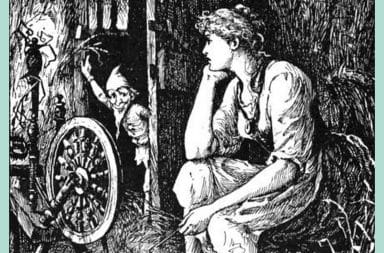German is probably the least sexy sounding language a human can speak without drilling themselves an extra asshole to pronounce new sounds. Or at least that's what a lot of people say. In actuality when actual Germans speak it (and not just your totally “hilarious” friend Todd doing impressions) it sounds pretty much just like any other language. Sure, it's not gonna take home all of the medals at the “Make Your Loins Quiver” Olympics, like French whispered by the light of a dying fire in the late eve, but it sounds fine.
German is a hilarious language, especially when you translate things into English literally. I mean, yeah, I get that a lot of languages sound silly when translated literally, but German really takes the cake.
See, some of you may have looked at some German words and laughed out loud at how long and ridiculously difficult they look to pronounce. This is because a lot of longer German words are literally just smaller words taped together. And they were created by the famous German linguist Doctor Philip Gofuckyourself in an attempt to really, really piss off anybody who decided it was a good idea to try and learn his language. Philip had some abandonment issues that he would never really work through until the later end of his life, you see.
Or I made that up.
Either way, the fact remains that German is an adorably hilarious language, and I'll prove it.
Right now.
Wackelpudding – Jello
Another name for this word in German is “gotterspeise” (something like “food/treat of the gods), but I like wackelpudding better. What does it mean? Wiggle pudding. Seriously. If that's not the most heartwarmingly adorable thing you've heard all day, then you have no joy or whimsy left in your pitiful existence.
Tee hee…wiggle pudding.
Zeug – Thing
Zeug in and of itself is a fairly boring word. It means “stuff” or “thing.”
But Germans, apparently as drunk as possible when they came up with their silly language, took a look at many of the objects around them, and in a display of laziness that I ironically find inspiring, just tacked “thing” to the end of them to name them.
What exactly do I mean? Well, here's a handy (and by no means all-inclusive) list:
- Feuerzeug (lighter) – fire thing
- Fahrzeug (vehicle) – drive thing
- Flugzeug (airplane) – fly thing
- Spielzeug (toy) – play thing
- Werkzeug (tool) – work thing
And the list goes on, but you get the idea.
Fettarme – Low fat
This word is how you say “low fat” in German. For instance, if you bought a bottle (or bag) of low fat milk, it would say “Fettarme Milch.” But the literal translation is “fat poor,” which is weird, because in English you can say something is “rich in [blank]” and it makes perfect sense, but for some reason the opposite is not true, and you can't say something is “poor” in something. German rejects that reality.
Rollstuhl – Wheelchair
Yeah, you read that right. They call wheelchairs “roll stools”, and while really, that isn't that much more different then “wheelchair”, I still find it silly.
Worterbuch – Dictionary
Outside of the “zeug” clusterfuck up there, I think the German word for “dictionary” really takes the cake in the “be as literal as possible in describing a things function” category. Literally, it means “word book.” You're welcome.
Fruchfleisch – Pulp
“Fruit meat” might sound like a half thought through title for a gay porno, but it's actually the literal translation of the German word for “pulp.” Kind of lends an almost violent vibe to every glass of orange juice. Not that my orange juice needs to be any more violent than it already is. I actually start every day crushing individual oranges by headbutting them on the counter while shouting random lyrics from Dragonforce songs.
Leichenwagon – Hearse
And because the language can be as morbid as it can be adorable, we now arrive at Leichenwagon. Hearse always sounded a bit odd to me, personally, but at the same time, there was a slight aura of dignity around it. Perhaps because it conjures up images of the departed, and those paying their respects to them. It's a good word, I feel.
But the Germans apparently had too much liquor that needed drinking to waste time coming up with a solemn and respectful word for the drive thing they use to haul around their dead, and just decided to call 'em “corpse wagons” before taking an early lunch.
Schnabeltier – Platypus
Yes, it's true that a quite frankly astounding number of German animals don't have unique names at all, and are in fact just random words tacked on to the beginning of other, less specific animal names.
For instance, raccoons are, for some godawful reason, called waschebaeren (wash bears). And a lot of animal names are like that, in the sense that they only really have like a dozen base animal names, and then add an adjective.
With the platypus, they didn't even get as far as finding a specific animal name to add to, and literally just call them “beak animals.”
Trinkgeld – Tips
Not all Germans are alcoholics. Not all Germans even drink. I just want to put that out there. Because, obviously they aren't all raging drunkards. But at the same time, their word for “tips”, the kind that you would get at a job as a waitress or bartender, literally means “drink money,” so, uh…I guess make of that what you will.
Esstabchen – Chopsticks
Okay, I was wrong. “Wiggle pudding” isn't the most adorable word in the German language, “esstabchen” is. Essentially, it means “little food stabber.” That sound you just heard was you going “D'Awwwww!” And now the rest of your day will be filled with sunshine and hefty unicorn shits.
And that sums up this edition of “Laughing At Other Cultures For Our Limited Amusement”. This message has been brought to you by me, Cole, and my new book, Wizards and Hard Drugs. No, seriously, I wrote a book about exactly what that title would suggest it's about. It only costs a dollar, and you can read about dicks and explosions, and even learn my real name.
Go ahead and buy it. What's the worst that could happen?


